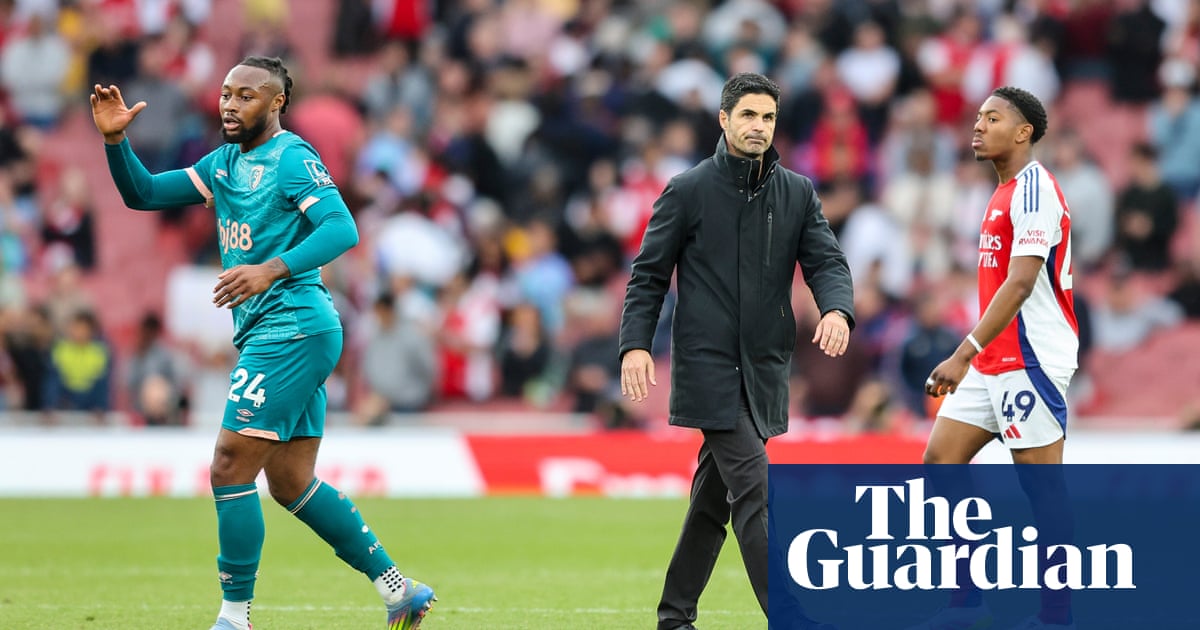Mikel Arteta promised to channel the frustration ofArsenal’s 2-1 home defeat against Bournemouthon Saturday into the mission to beat Paris Saint-Germain in the Champions League semi-final.
The manager endured the worst preparations for Wednesday night’s second-leg in Paris, where Arsenal will attempt to turn arounda 1-0 deficit, going strong with his starting line-up and watching Bournemouth come from behind in the second-half.
Once again, Arsenal’s achilles heel was their inability to defend properly on set-pieces, Dean Huijsen equalising forBournemouthafter a long throw and Evanilson bundling in the winner on a corner. Arsenal have conceded 12 of their 31 Premier League goals this season from set-pieces (excluding penalties). Only four clubs have conceded more in the competition.
“We certainly wanted to create a really good vibe [for Paris], a positive result would really help us to build what we wanted towards Wednesday,” Arteta said. “What we have created now is a lot of rage, anger, frustration and a bad feeling in the tummy. So, make sure that we use that for Wednesday to have a massive performance in Paris, win the game and be in the final.”
Arsenal led through Declan Rice but Arteta lamented their ability to kill off a Bournemouth team who gave their hopes of a first ever European qualification a boost. “On top of that, you defend the box really poorly … the way we’ve done it in the two set pieces that we have conceded again,” Arteta said. “Certainly, what happened today is that we defended the way we’ve done, very few set pieces but very poorly [defended]. In the league, you’re going to get punished.”
Arteta said he picked his strongest available line-up because, unlike his PSG counterpart Luis Enrique, who made ten changes for a 2-1 defeat at Strasbourg, Arsenal still have plenty to play for in the league. They are not certain of a top-five finish that would return them to next season’s Champions League. Their final three league games are Liverpool (away), Newcastle (home) and Southampton (away).
“PSG have won the league so they have the luxury to do that,” Arteta said. “We still have a lot to do in the Premier League. Because mathematically we are not qualified. We haven’t had the right to finish second yet so we still have a lot to do.”
Arteta rested Jurrien Timber because of a minor knock that the defender suffered in the first-leg against PSG. Arteta claimed he was not confident about Timber’s fitness for Paris. “Confident? At the moment, no, because he wasn’t able to play here and we play them in four days,” Arteta said. “What is the issue with him? I cannot tell you.”
Sign up toFootball Daily
Kick off your evenings with the Guardian's take on the world of football
after newsletter promotion
Evanilson’s goal was controversial because it looked as though he might have handled the ball. The VAR gave him the all-clear after a lengthy check. “I’ve seen a few images and it looked very different to the decision but they made that decision,” Arteta said.
The Bournemouth manager, Andoni Iraola, was asked whether he felt any measure of justice after being on the wrong side of many VAR calls this season. “No,” he replied. “If you’ve seen our games, it is not justice. I would like to know where we would be in the standings without VAR.”
